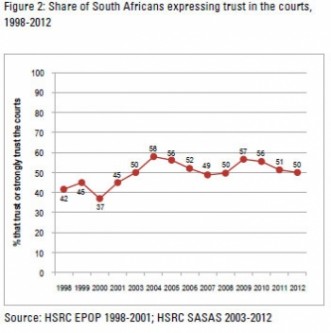South Africans have a poor view of the court system
Research by the Human Sciences Research Council (HSRC) showing that only half of South Africans believe the courts are fair and impartial is perhaps not that alarming in itself, as this sort of level of distrust in the justice system is common elsewhere in the world, according to an editorial in Business Day.

Unlike other branches of the government, the courts do not have a police force or money to enforce their rulings. The system relies on the credibility of the institution encouraging the public to comply with and respect the rule of the law and court decisions because they believe in their fairness and impartiality. It requires the state to respect its judgments and to act on its behalf, such as sending those who have been convicted after a fair trial to jail, or forcing people on the losing side of civil claims to pay up.
If a critical mass of people do not believe the courts are impartial, the whole system wobbles. To protect this independence and legitimacy, it is critical that the state be seen to support and uphold court decisions and respect judicial independence, even when decisions go against it. Yet, in many cases, it is our politicians themselves who lead the assault on this independence, labelling the courts as opposition forces or impediments to transformation, or ignoring judgments.
Government and political parties have been warned on a number of occasions that their undermining of the country’s legal system will have negative consequences for our democracy. The lack of belief in our courts emerging among young people in particular is partly a consequence of this behaviour.
A trusted and independent judiciary is an essential pillar of liberty. Without it, the state loses a tool to resolve disputes and administer the law impartially between individuals and between citizens and public authorities. Without a fair and trusted legal system, citizens risk their rights and freedoms.
That is not to say that the courts are above criticism. But when they are brought under scrutiny, this should be done with great caution.
Highlights of the report:
- Half the South African adult population indicated that they thought the courts were doing a good job. From a comparative perspective, South Africa ranks above many European states in terms of court confidence.
- The results suggested that the majority of South Africans believed the court system discriminated on the basis of wealth and race. This belief was particularly pronounced among young South Africans.
- Half of all South Africans in 2012 indicated that they trusted the courts, which represented a decline from 2009 when 57% of the population trusted the courts.
- On average, adult South Africans tended to view the criminal courts as more prone to error (mean = 5.7) than Europeans on average (5.1), placing us alongside Spain, Slovakia and the Ukraine.
- Regarding procedural fairness, adult South Africans gave responses that were above the mid-point on the scale (5.8). Cross-nationally, South Africans rated the criminal courts slightly lower than the European average (5.9), rating the country alongside Slovenia, Spain and the Czech Republic.
- In order to measure perceptions of racial bias in the courts, survey respondents were asked who they felt would be most likely to be found guilty if “two people from different race or ethnic groups each appeared in court, charged with an identical crime they did not commit”. More than two-fifths (44%) reported that black South Africans were more likely to be found guilty, with 42% stating that the courts would in actual fact remain impartial.
- To measure perceived class bias in the courts, survey participants were asked: if two people – one rich, one poor – each appear in court, charged with an identical crime they did not commit, who do you think would be most likely to be found guilty? Approximately half (51%) of all South Africans felt that the poor person would be more likely found guilty, with less than two-fifths (38%) reporting that both would have an equal chance.
View the HSRC report here.
















